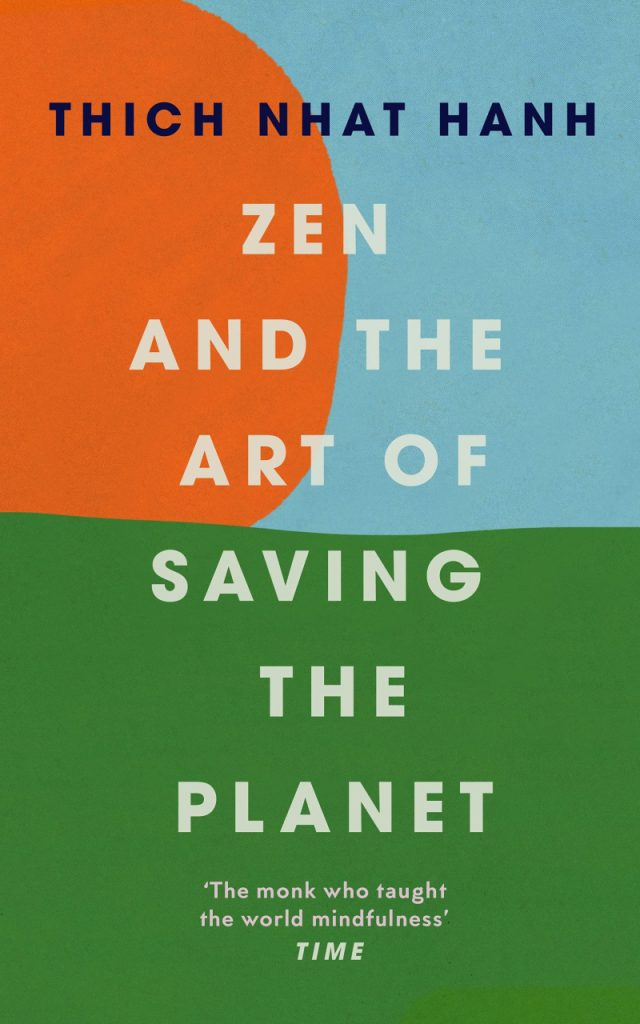author
Jacques Lawinski
post
- 24/02/2023
- No Comments
- Reviews
share
Zen and the Art of Saving the Planet – Thich Nhat Hanh
Penguin Random House, 2021.
The ‘monk who brought mindfulness to the West’ shares his wisdom on how we can be the change we need to see to confront the ecological crisis.

From the Vietnamese monk who brought the idea of mindfulness to the Western world, this book brings together a collection of Thich Nhat Hanh’s writings on the relation between humans and their environment. He’s keenly aware of the impact that environmental destruction and climate change can have on our mental health, and he provides some key ways in which mindfulness and meditation can help us to overcome these difficulties.
The spiritual path is not for everyone, but for many of us who feel some kind of relationship with nature, learning new ways of relating and being is a meaningful and oftentimes rewarding task. Learning the true insight of interbeing, and the interconnectedness of all beings, is an important part of the scientific findings from ecology as well as the spiritual and ethical pathways. We see that in fact, both point to the same conclusion: we are earth, we are nature, and by looking after ourselves better, we are better able to look after others, and look after the environment, too.
Part of this pathway is learning that it is in our nature, and the nature of all living things, to change – to be born, to change in life, and to die again. Non-attachment to views, to particular ways of doing things, and to particular forms of life, is a key part of the Buddhist belief system. However, this is often criticised by non-Buddhists, and some Buddhists, for leading to some kind of apathy – we should not care because everything will change, and we are just passing through like all other beings. This, however, is a mistaken way to view things. If we realise that we too are part of this universe like all other beings, we realise that we cannot hold onto anything like all other species, but we can care for and look after all beings to reduce our, and their suffering. By reducing our collective suffering, our changeable time here on earth becomes pleasurable and peaceful, rather than violent and difficult.
The book is filled with practical mindfulness methods, as well as examples from both Thich Nhat Hanh and his community of practitioners. These examples show us that it is possible to put to use these tips and pieces of advice from Buddhism, and that a peaceful and considerate route does work and can make a difference. Sometimes speaking the truth from a place of calm and respect does wonders to help others listen and respect our point of view.
On the other hand, listening to those who think differently to us is equally important. We have to understand what is going on in their lives and why they think what they do, if we have any chance of introducing them to ecological ways of thinking and being.
This book is easy to read and highly engaging, and will definitely inspire readers to add some moments of mindfulness to their daily practice, if they don’t already have these. Meditation is a good place to start, but even just taking the time to sit and be with ourselves and accept the emotional rollercoaster that we are on is a great way to understand who we are and the true nature of our relationship with the environment.
Zen and the Art of Saving the Planet is available at Paper Plus NZ here, or check out your local bookshop to see if they have it in stock or can order it for you.
It took more than 30 hours of research and writing to produce this article, which will always be open and free for everyone to read, without any advertising.
All our articles are freely accessible because we believe that everyone needs to be able to access to a source of coherent and easy to understand information on the ecological crisis. This challenge that confronts us all will only be properly addressed when we understand what the problems are and where they come from.
If you've learned something today, please consider donating, to help us produce more great articles and share this knowledge with a wider audience.
Why plurality.eco?
Our environment is more than a resource to be exploited. Human beings are not the ‘masters of nature,’ and cannot think they are managers of everything around them. Plurality is about finding a wealth of ideas to help us cope with the ecological crisis which we have to confront now, and in the coming decades. We all need to understand what is at stake, and create new ways of being in the world, new dreams for ourselves, that recognise this uncertain future.
Copyright © Plurality.eco 2023

